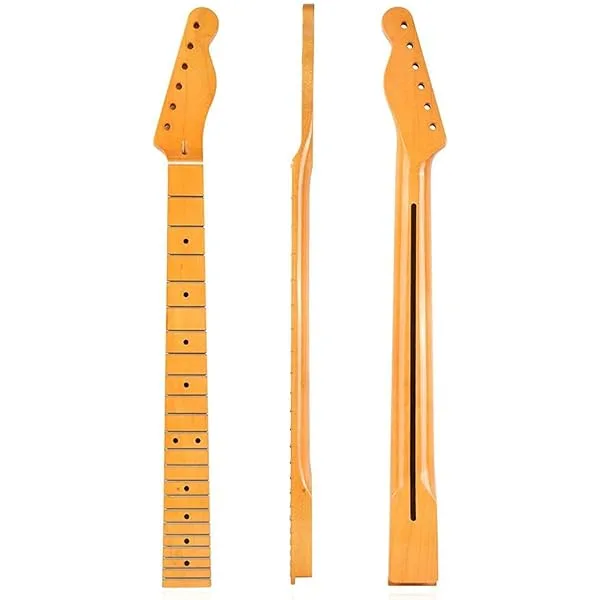Are you in the market for a new guitar, but not sure which scale length is right for you? The 24.75 scale guitar neck may be just what you’re looking for! As a musician and avid guitar collector, I understand how overwhelming it can be to choose the perfect instrument. But fear not – I’m here to help!
In this article, we’ll delve into everything there is to know about the 24.75 scale guitar neck. From its advantages and disadvantages compared to other scales, to the best options on the market, consider this your ultimate guide. Whether you’re a beginner or an experienced player, by the end of this article, you’ll have all the information you need to make an educated decision on your next guitar purchase. So let’s get started and explore everything that makes the 24.75 scale so unique!
So, 24.75 scale guitar neck?
A 24.75 scale guitar neck refers to the length of the fretboard from the nut to the bridge, measuring at 24.75 inches. This scale length is commonly found on many popular guitar models, including Gibson Les Pauls and SGs.
One of the main benefits of a 24.75 scale neck is its shorter length, making it easier for players with smaller hands or shorter fingers to reach all of the frets comfortably. It also tends to have a warmer tone compared to longer scale lengths, which can be attributed to less string tension and a looser feel.
However, there are some downsides to this scale length as well. The shorter distance between frets may make it more challenging for players who prefer wider spacing between strings or those used to longer scales.
When considering purchasing a guitar with a 24.75 scale neck, it’s important to keep in mind that not all guitars are created equal – even within this specific measurement range. Some manufacturers may slightly deviate from this standard measurement, so it’s always best to try out different guitars before making a decision.
Overall, whether you’re looking for comfort in playing or seeking a unique tonal quality, a 24.75 scale guitar neck has its advantages and disadvantages like any other instrument feature – but ultimately comes down personal preference and finding what works best for your individual style and needs.
Understanding the Importance of Scale Length in Guitars
When it comes to guitars, the scale length plays a crucial role in shaping both the instrument’s sound and playability. Scale length is the distance from the nut (where the strings rest at the top of the neck) to the saddle (where they rest on the bridge). This measurement directly affects string tension; longer scales create tighter strings, producing brighter tones with more sustain. Conversely, shorter scales tend to offer a warmer sound and lighter string tension, making them easier for some players to bend notes and fret chords. Musicians often choose their guitar not just based on aesthetics or brand but also how its scale length complements their unique style.
For example, a classic Fender Stratocaster has a 25.5-inch scale that lends itself beautifully to rock and blues genres due to its sharp articulation. On the other hand, many Gibson models feature a 24.75-inch scale that enhances warmth and fullness—ideal for jazz or heavier styles where rich tones are preferred. It’s fascinating how this single measurement can influence everything from finger placement to musical expression! Understanding these nuances allows players of all skill levels to find an instrument tailored perfectly for their needs, enhancing both performance and enjoyment as they strum away melodies and harmonies.
Read also: 10 guitar rack
Dissecting the Features and Characteristics of a 24.75 Scale Guitar Neck
When we think about guitar necks, the scale length plays a crucial role in shaping the instrument’s sound and playability. A 24.75-inch scale guitar neck is shorter than many of its counterparts, like the more common 25.5-inch necks found on other guitars. This difference means that each fret is closer together, making it easier for younger players or those with smaller hands to navigate chords and solos. The feel of a 24.75 scale can be described as warm and rounded, resulting in rich tones that are particularly inviting when playing blues or rock music. It also provides a unique tension on the strings; lighter gauge strings tend to feel softer under your fingers while still producing vibrant sounds.
The characteristics don’t stop at just size; they also influence how different styles resonate with this type of neck. Many musicians find that power chords ring out clearer, while lead solos can soar effortlessly across frets without losing clarity or depth.
Additionally, these instruments often come equipped with features such as smooth fretboards and comfortable contours for easy access to higher notes—perfect for expressive melodies! With every strum or pluck, you’ll appreciate how this specific design enhances both technique and creativity, making it an appealing choice for various genres from jazz to metal.

Advantages and Disadvantages: Comparing 24.75 Scale Guitar Necks with Other Scales
When you pick up a guitar with a 24.75-inch scale neck, something magical happens. This shorter scale length makes the strings easier to press down, which can be especially helpful for beginners or those who favor bending notes. The smoother feel allows for expressive playing and enhances your ability to play intricate solos without straining your fingers. Many iconic guitars, like the Gibson Les Paul, feature this scale length and are known for their rich tones and warm sound. Players often appreciate how the shorter distance between frets creates a more comfortable reach, allowing them to navigate through chords and melodies effortlessly.
However, there are some drawbacks when comparing it to longer scales like 25.5 inches found on Fender guitars. A longer scale means tighter string tension, which can lead to a brighter tone with more sustain—a quality many skilled players seek in their instruments. Additionally, the spacing of the frets is wider in long-scale guitars; this can enhance precision during complex fingerings but might also present challenges for those with smaller hands or less experience.
Ultimately, choosing between these scales comes down to personal preference and playing style; each offers unique benefits that resonate differently with every musician.
Choosing the Best Brands for 24.75 Scale Guitar Neck
When it comes to selecting the right brand for a 24.75 scale guitar neck, several key factors come into play. First and foremost, quality is essential. A well-crafted neck can significantly influence your playing experience and sound quality. Brands like Gibson are renowned for their craftsmanship and design integrity, offering solid wood materials that enhance tone and sustain. Many musicians also appreciate custom options from smaller companies like Warmoth, which allow players to personalize their instruments down to the last detail—think of different woods, finishes, or fret types.
Additionally, consider the reputation of these brands in terms of durability and playability. Some brands prioritize innovation while maintaining traditional methods; they create necks that feel comfortable during long sessions but do not sacrifice stability over time. Companies such as Seymour Duncan provide excellent support for modifications or upgrades too! Here’s a quick list of what to look for when choosing:
- Material Quality: Look for solid woods over laminates.
- Crafters’ Reputation: Research user reviews on forums.
- Customization Options: Consider brands that offer personalized features.
By focusing on these aspects, you’re more likely to find a guitar neck that feels just right in your hands!
You may also like: hazelton bros piano
Conclusion: Is a 24.75 Scale Guitar Neck Right for You?
When considering whether a 24.75 scale guitar neck is the right choice for you, it’s important to grasp its unique characteristics. This scale length, commonly found on guitars like Les Pauls and some semi-hollow body instruments, offers a sweeter tone that many players adore. The shorter distance between frets makes it easier to play chords and complex fingerings without straining your fingers too much. If you’re someone who enjoys playing leads or bending notes, this could be an exciting option to explore.
However, every guitarist has different preferences based on their style and experience level. A 24.75 scale can feel quite different compared to longer scales like 25.5 inches typically seen in Fender guitars; each brings its distinct sound and playability features. For beginners or those with smaller hands, this neck length can provide added comfort while learning new techniques.
On the other hand, advanced players might appreciate how it enhances sustain and warmth in their music but may need time to adjust if they are used to longer scales.
Ultimately, trying out various options at your local music store will help you find what resonates most with your playing style!

